-
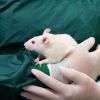 +23 +1
+23 +1FDA no longer requires animal testing for new drugs. Is that safe?
The U.S. Food and Drug Administration (FDA) no longer requires new drugs to be tested in animals before being approved. Thanks to a law passed in December 2022(opens in new tab), the agency now has the option to approve drugs that are tested in only non-animal studies, including those that use lab-grown tissues or computer models, before being tested in clinical trials with humans.
-
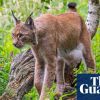 +15 +1
+15 +1Lynx facing extinction in France as population drops at most to 150 cats
Urgent action needed as DNA tests show their genetic diversity is so low they could vanish from the country in 30 years
-
 +21 +1
+21 +1Researchers discover secret of building a better wildlife overpass
A group of researchers at the University of British Columbia got to work locating, measuring and then evaluating a number of these overpasses to see how different dimensions impact how effective an overpass is at encouraging wildlife to cross.
-
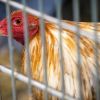 +17 +1
+17 +1All 32 fighting roosters rescued in Austin have found new homes
About 30 roosters rescued from cockfighting last month have evaded euthanasia and found new homes, Austin Pets Alive announced Wednesday. The nonprofit animal rescue has been trying to find sanctuaries for these fighting roosters over the last few weeks. The roosters were scheduled to be euthanized Wednesday, but homes were found for them in time.
-
 +17 +1
+17 +110 states have now banned the sale of cosmetics tested on animals
New York became the tenth state to ban the sale of cosmetics tested on animals after Gov. Kathy Hochul signed a measure into law Thursday evening.
-
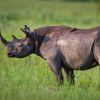 +21 +1
+21 +1Rhino Poaching Way Down in Botswana
Botswana said it's seen a dramatic drop in rhinoceros poaching this year after taking greater steps to protect its shrinking rhino population. The significant decline was revealed in a report presented this week at a conference on CITES – the Convention on International Trade in Endangered Species. After losing 126 animals between 2018 and 2021, only six rhinoceroses have been poached in Botswana in 2022.
-
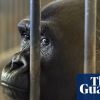 +13 +1
+13 +1‘Dying of boredom’: the fight to release Thailand’s shopping mall gorilla
Bua Noi has spent decades in a cage in a decaying Bangkok shopping mall. Her owner says is she too old to be transferred to a sanctuary but activists disagree
-
 +18 +1
+18 +1Are octopuses too intelligent to eat?
Oil-crisped tentacles, paper-thin carpaccio and octopus meat plump from slow-cooking have been popping up on restaurant menus across the country, where the long-time Mediterranean ‘superfood’ is fast being adopted as the British gourmand’s dinner-plate darling. What was once an exotic holiday meal is now consumed to the tune of 1,300 tons per year in the UK, up 12-fold since 1990. In the decade to 2019, the global trade doubled to a value of more than £2 billion.
-
 +12 +1
+12 +1Walrus Freya who became attraction in Norway's Oslo Fjord put down
Freya had to be euthanised because the public went too close to her, officials said.
-
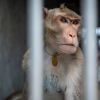 +14 +1
+14 +1Primate Disappearing at ‘Alarming Rate,’ as Medical Research Fuels Demand
"People are battling each other to get to the monkeys and to have these monkeys for research,” one expert told VICE World News.
-
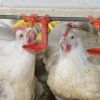 +13 +1
+13 +1A million UK chickens ‘die needlessly each week to keep prices low’
More than a million meat chickens are dying every week in the UK before reaching slaughter weight, according to a new report. An analysis of government figures by the animal welfare charity Open Cages reveals about 64 million chickens die prematurely each year in the UK. The dead birds can be incinerated or rendered into usable materials such as protein meal.
-
 +21 +1
+21 +1The Future of Leather: How Pineapple Leaves, Cacti, and Mycelium Are Revolutionizing the Industry
Leather is everywhere – in our shoes, our purses and luggage, our winter jackets and stylish furniture – but its effect is seen globally. To create the leather for our clothing, homewares, and other purposes, billions of cows are slaughtered each year. The livestock sector – which produces both food products and leather – is the biggest use of agricultural land worldwide. Grazing land and farmed feed crops for cattle result in deforestation, eliminating vital carbon sinks, destroying ecosystems, and harming nearby communities.
-
 +16 +1
+16 +1The case for speaking politely to animals
How we speak matters to animals. Horses, pigs and wild horses can distinguish between negative and positive sounds from their own species, near relatives and humans.
-
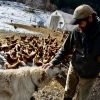 +16 +1
+16 +1Canada’s pork industry keeps pigs in feces and filth
How well we lionize physical courage while repudiating bravery’s rarer form — moral courage. That’s the ability to know what is right, writ-large, and what is wrong (no matter what the law) and then to act on it, not for self-profit or glory or even selfies, but because not acting is intolerable.
-
 +15 +1
+15 +1Black shelter animals weren't getting adopted. A photographer had an idea: glam shots
Maggie Epling was looking for a chance to do something good during her summer break from college. She wanted to find an activity that combined her interests and she found the perfect opportunity at a local animal shelter. "I thought about volunteering and I've always loved animals and photography," she told NPR.
-
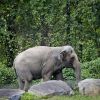 +14 +1
+14 +1Happy is an Asian elephant. But is she also a person?
She has four limbs, expressive eyes and likes to stroll through greenery in New York City. Happy, by species, is an Asian elephant. But can she also be considered a person? That question was before New York’s highest court Wednesday in a closely watched case over whether a basic human right can be extended to an animal.
-
 +4 +1
+4 +1How do we transcend this anthropocentric world and realize that animals are here with us, not for us?
Already the Buddha, ancient, medieval and ecclesiastical philosophers have emphasized that we will do good, that is, in accordance with morality, if we use self-discipline and control of our passions and desires. As Plato said, the first and greatest victory is to overcome yourself; being defeated by oneself, however, is something most shameful and base.
-
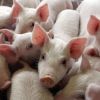 +15 +1
+15 +1Farm animals and humans should be treated the same, children say
Children think farm animals deserve to be treated as well as human beings but lose this belief in adolescence, a groundbreaking study has found. Researchers from the universities of Exeter and Oxford asked a group of British children aged nine to 11, young adults aged 18 to 21 and older men and women about their attitudes to different sorts of animals.
-
 +27 +1
+27 +1Elon Musk's Neuralink confirms monkeys died in project, denies animal cruelty claims
Elon Musk's implant company Neuralink, which aims to enable brains to connect and communicate with computers, has acknowledged that monkeys died as part of its testing procedures, but denies allegations of animal cruelty.
-
 +14 +1
+14 +1These 50 metre-high rope bridges are helping sloths in Costa Rica survive deforestation
Zoologist Rebecca Cliffe knows some people see sloths as "boring, lazy animals," but she believes there's something special about their slow pace.
Submit a link
Start a discussion




















